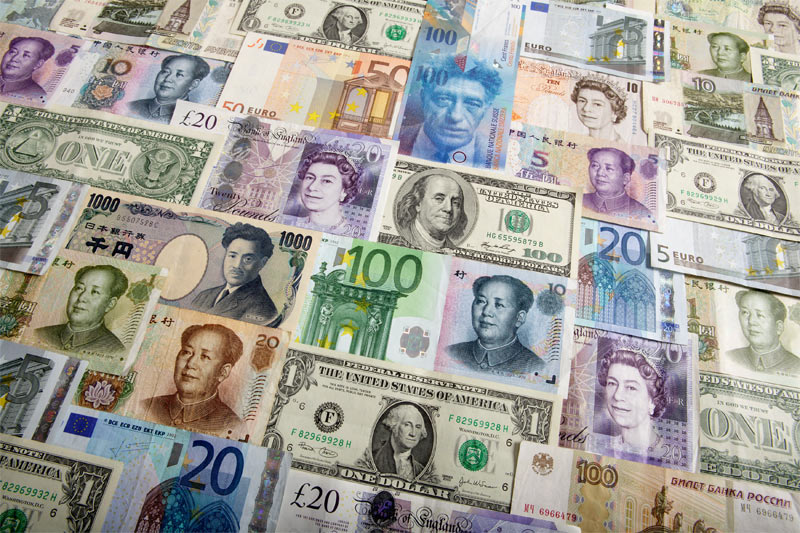Investing.com - The dollar rallied to fresh six year highs against the yen on Friday and hit a new 14-month peak against the euro as expectations for an early hike in U.S. interest rates continued to underpin investor demand for the greenback.
USD/JPY was last up 0.34% to 109.06 after rising as high as 109.46 earlier in the day, the most since August 2008. For the week, the pair added 1.61%.
EUR/USD was down 0.71% to 1.2830 in late trade, the lowest level since July 2013.
The US Dollar Index, which tracks the performance of the greenback versus a basket of six other major currencies, ended Friday’s session up 0.63% to 84.93, the highest level since July 2013, capping its tenth consecutive week of gains.
The dollar has rallied in the past two months as economic data indicated that the U.S. recovery is progressing strongly, while growth in Japan and the euro zone appears to be faltering.
On Wednesday the Federal Reserve offered fresh guidance on its plans to raise interest rates, underlining the diverging policy stance between it and central banks in Japan and Europe, which look likely to continue with looser monetary policy.
The Fed statement reiterated that it expects rates to remain on hold for a "considerable time", after its bond purchasing program ends, but it outlined in more detail how it will start to raise short term interest rates when the time comes.
The Fed also cut its monthly asset purchase program by another $10 billion, keeping the program on track to finish next month.
The dollar was also higher against the pound, with GBP/USD down 0.68% to 1.6284 in late trade. The pair hit a two week high of 1.6523 earlier on Friday after voters in Scotland’s independence referendum elected to remain inside the United Kingdom.
The pound fell to 10 month lows against the dollar earlier this month as uncertainty over the outcome of the referendum rattled financial markets, before recovering in the run-up to Thursday’s vote.
The pound also trimmed gains against the euro, with EUR/GBP at 0.7878 in late trade, off the two year lows of 0.7809 struck earlier in the session.
Elsewhere, the Australian dollar fell to a fresh six month trough on Friday, with AUD/USD down 0.66% to 0.8928, while NZD/USD was down 0.39% to 0.8119, not far from Thursday’s six month lows of 0.8076.
In the week ahead, investors will be awaiting Tuesday’s data on euro zone private sector activity, amid concerns that the recovery in the region is losing momentum. Preliminary data on manufacturing activity in China will also be closely watched.
The week will also bring a fresh look at the U.S. housing sector, with reports on both new and existing home sales, as well as Thursday’s data on durable goods orders and initial jobless claims.
Ahead of the coming week, Investing.com has compiled a list of these and other significant events likely to affect the markets.
Monday, September 22
New Zealand is to release private sector data on consumer sentiment.
European Central Bank President Mario Draghi is to appear before the European Parliament's Economic and Monetary Committee, in Brussels.
The U.S. is to release private sector data on existing home sales.
Tuesday, September 23
Markets in Japan are to remain closed for a national holiday.
China is to release the preliminary reading of its HSBC manufacturing index.
The euro zone is to publish preliminary data on private sector activity, while Germany and France are to also to publish data on private sector growth.
The U.K. is to release private sector data on mortgage approvals, as well as a report on public sector borrowing.
Canada is to release data on retail sales, the government measure of consumer spending, which accounts for the majority of overall economic activity.
Wednesday, September 24
New Zealand is to release data on the trade balance, the difference in value between imports and exports.
The Reserve Bank of Australia is to publish its financial stability review.
The Ifo Institute is to release its report on German business climate.
The U.S. is to publish data on new home sales.
Thursday, September 25
RBA Governor Glenn Stevens is to speak at an event in Melbourne; his comments will be closely watched.
The ECB is to publish data on M3 money supply and private loans.
The U.S. is to release reports on durable goods orders and initial jobless claims.
Friday, September 26
Japan is to release data on consumer price inflation, which accounts for the majority of overall inflation.
The Gfk think tank is to release a report on German consumer climate.
The U.S. is to release revised data on gross domestic product, the broadest indicator of economic activity and the leading measure of the economy’s health. The U.S. is also to release revised data on consumer sentiment.
